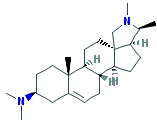|
CONESSINE |
| Synonyms. Conessine; (3-beta)-N,N-Dimethylcon-5-enin-3-amine; 3beta-(Dimethylamino)con-5-ene; Conesina; Conessin; Conessinum; Konessin; Neriine; Roquessine; Wrightine; 3beta-(Dimethylamino)con-5-enine; N,18-Dihydrotrimethylconkurchine; |
|
|
| PRODUCT IDENTIFICATION | |
|
CAS RN |
546-06-5 |
|
EINECS RN |
208-897-2 |
|
FORMULA |
C24H40N2 |
|
MOLE WEIGHT |
356.59 |
|
H.S CODE |
2939.99.0000 |
|
SMILES |
C1[C@@]23[C@@H](CC[C@@H]2[C@@H]2CC=C4[C@@](CC[C@@H] (N(C) C)C4) ([C@@H]2CC3)C) [C@@H](C)[N@@]1C |
|
CLASSIFICATION |
Alkaloid |
|
EXTRA NOTES |
Conessine is a plant steroid alkaloid that acts as a potent and specific antagonist of histamine H3 receptors (Ki = 5.37 and 24.5 nM for human and rat receptors, respectively). Conessine is 1860-fold selective for H3 over H4 and does not bind to H1 or H2 receptors. The molecule also binds to the human α2C4 adrenergic receptor (pKi = 7.98). sigmaaldrich |
|
|
| PHYSICAL AND CHEMICAL PROPERTIES | |
|
PHYSICAL STATE. |
white to off-white crystalline powder |
|
MELTING POINT |
125 ~ 126 C |
|
BOILING POINT |
|
|
DENSITY |
|
|
SOLUBILITY IN WATER |
|
| SOLVENT SOLUBILITY |
|
|
VAPOR DENSITY |
|
|
log P(octanol-water) |
5.14 |
|
VAPOR PRESSURE |
|
|
AUTOIGNITION TEMP |
|
| pK |
|
|
REFRACTIVE INDEX |
|
|
FLASH POINT |
|
|
|
| STABILITY AND REACTIVITY | |
| STABILITY | Stable under normal conditions. |
|
INCOMPATIBLE MATERIALS |
Strong oxidizing agents |
| POLYMERIZATION |
Has not been reported |
|
NFPA RATINGS |
Health: 1, Flammability: 0, Reactivity: 0 |
|
|
| EXTERNAL LINKS & GENERAL DESCRIPTION |
|
USA.gov - Conessine Wikipedia Linking - Conessine Google Scholar Search - Conessine U.S. National Library of Medicine - Conessine PubChem Compound Summary - Conessine KEGG (Kyoto Encyclopedia of Genes and Genomes) - Conessine ChEBI (http://www.ebi.ac.uk/chebi/) - Conessine NCBI (http://www.ncbi.nlm.nih.gov/) - Conessine |
|
|
| SALES SPECIFICATION | |
|
APPEARANCE |
white to off-white crystalline powder |
|
ASSAY |
98% min |
|
MELTING POINT |
125 ~ 126 C |
|
|
| TRANSPORT & REGULATORY INFORMATION | |
|
UN NO. |
|
| HAZARD CLASS |
|
| PACKING GROUP | |
|
|
| SAFETY INFORMATION | |
|
HAZARD OVERVIEW |
GHS (Globally Harmonised System) Classification: Acute toxicity (Oral). Skin irritation. Eye irritation. Specific target organ toxicity - single exposure. Hazard statements: Causes skin irritation. Causes serious eye irritation. May cause respiratory irritation. |
| SIGNAL WORD | Warning |
|
PICTOGRAMS |
|
|
HAZARD STATEMENTS |
H315-H319-H335 |
|
P STATEMENTS |
P261-P305 + P351 + P338 |
| EC DIRECTIVES |
|
| HAZARD CODES |
|
|
RISK PHRASES |
36/37/38 |
|
SAFETY PHRASES |
26 |
|
|
| PACKING |
|
Preserve in light-resistant and well-closed containers |
|
|

